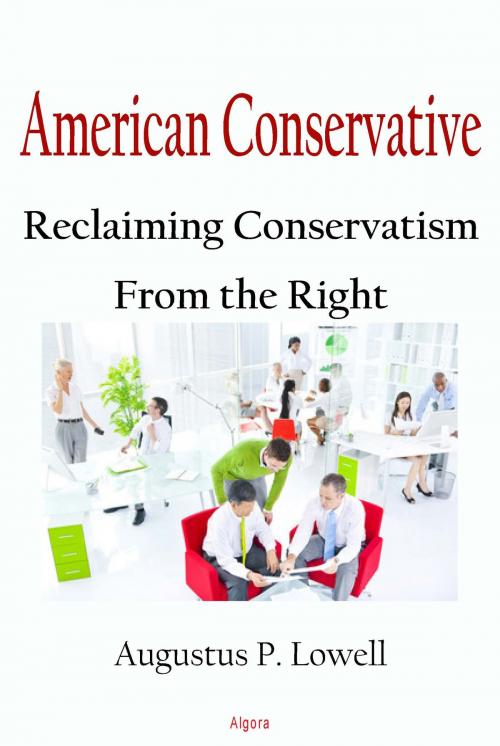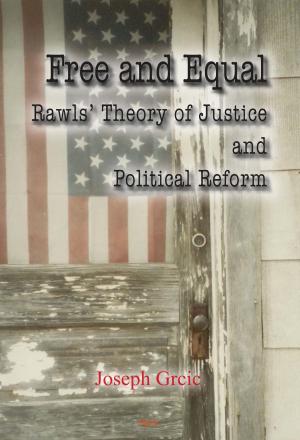American Conservative
Reclaiming Conservatism From the Right
Nonfiction, Social & Cultural Studies, Political Science| Author: | Augustus P. Lowell | ISBN: | 9781628942453 |
| Publisher: | Algora Publishing | Publication: | October 5, 2016 |
| Imprint: | Algora Publishing | Language: | English |
| Author: | Augustus P. Lowell |
| ISBN: | 9781628942453 |
| Publisher: | Algora Publishing |
| Publication: | October 5, 2016 |
| Imprint: | Algora Publishing |
| Language: | English |
Carson? Christie? Rubio? Cruz? Trump? This is the best we can do? This is what passes for conservatism these days? When did that once-honorable political tradition become so narrow, boorish, and ignorant?
It’s time to take the conversation back. Conservatism can be intelligent and thoughtful. There is an alternative to the excesses of liberalism that doesn’t require us to turn the clock back a century, that isn’t tied to religion, that embraces a responsibility for society and culture, that isn’t terrified of change, and that speaks to the commonalities we share instead of dividing us into tribes. Conservatives and liberals could work together if they would take an honest look both at each others’ beliefs and at their own.
In the 2016 Presidential primary season, half the Republican candidates were clowns and the rest were, if not actually clowns, giving every appearance of bowing to the ringmaster and piling into the clown car. They called themselves conservative but their understanding of what that means seemed shallow and opportunistic. Theirs was a parody of conservatism that mocked the real thing.
Yet it seems most people take them at their word and grant them the authority they assert for themselves: not merely that they are "conservative" but that their brand of conservatism is the entirety of conservatism; not merely that they are "conservative" but that they speak for all conservatives. It is infuriating. And it is wrong.
There are many books about politics, but most of them contain either dryly academic pedantry or overtly partisan persuasion. This book is neither. It is a polemic, of a sort, but the intent is not to persuade people to vote conservative or that conservatism is completely right. It is to persuade people that conservatism has something worthwhile to say to them, that conservatism is not what its most abhorrent spokesmen claim it to be. The intent is to change the conversation. If that changes the outcome, so much the better.
Carson? Christie? Rubio? Cruz? Trump? This is the best we can do? This is what passes for conservatism these days? When did that once-honorable political tradition become so narrow, boorish, and ignorant?
It’s time to take the conversation back. Conservatism can be intelligent and thoughtful. There is an alternative to the excesses of liberalism that doesn’t require us to turn the clock back a century, that isn’t tied to religion, that embraces a responsibility for society and culture, that isn’t terrified of change, and that speaks to the commonalities we share instead of dividing us into tribes. Conservatives and liberals could work together if they would take an honest look both at each others’ beliefs and at their own.
In the 2016 Presidential primary season, half the Republican candidates were clowns and the rest were, if not actually clowns, giving every appearance of bowing to the ringmaster and piling into the clown car. They called themselves conservative but their understanding of what that means seemed shallow and opportunistic. Theirs was a parody of conservatism that mocked the real thing.
Yet it seems most people take them at their word and grant them the authority they assert for themselves: not merely that they are "conservative" but that their brand of conservatism is the entirety of conservatism; not merely that they are "conservative" but that they speak for all conservatives. It is infuriating. And it is wrong.
There are many books about politics, but most of them contain either dryly academic pedantry or overtly partisan persuasion. This book is neither. It is a polemic, of a sort, but the intent is not to persuade people to vote conservative or that conservatism is completely right. It is to persuade people that conservatism has something worthwhile to say to them, that conservatism is not what its most abhorrent spokesmen claim it to be. The intent is to change the conversation. If that changes the outcome, so much the better.















